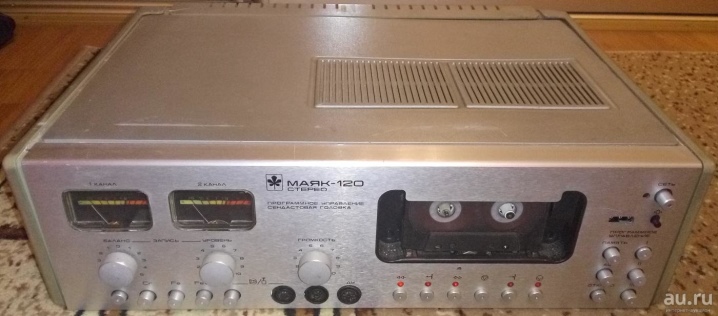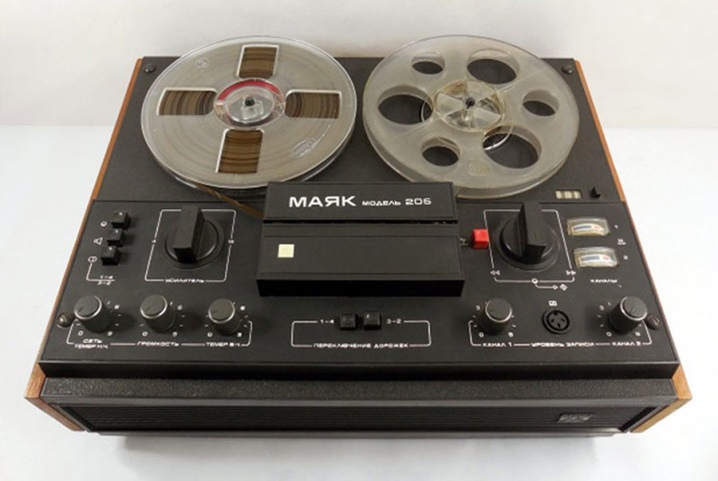Tape recorders "Mayak": features, models, connection diagram

The tape recorder "Mayak" was one of the best in the seventies in the USSR. The originality of the design and innovative developments of that time put the devices of this brand on a par with the audio equipment of Sony and Philips.


history of the company
The Mayak plant was founded in 1924 in Kiev. Before the war he repaired and produced musical instruments. Since the beginning of the fifties, the first Soviet tape recorder "Dnepr" began to be produced. For twenty years (from 1951 to 1971), about 20 models were developed and launched into a series. The most popular were tape recorders of the "Mayak" series, the release of which began in 1971.
The Mayak-001 model was recognized as the best among domestic tape recorders. In 1974 she was awarded a gold medal at the exhibition.
At the same plant, cassette recorders were also produced for the first time:
- single-cassette "Mayak-120";
- two-cassette "Mayak-242";
- radio tape recorder "Lighthouse RM215".



Peculiarities
The first compact cassette appeared in 1963. At the end of the sixties, the most popular cassette recorder in Europe was the Philips 3302. The compact cassette was the basic audio carrier in the world until the mid-90s of the last century. The recording was made on a magnetic tape 3.82 mm wide and up to 28 microns thick. There were two mono tracks and four stereo tracks in total. The tape was moving at a speed of 4.77 cm per second.

One of the most successful models was considered a two-cassette tape recorder. "Mayak 242", which has been produced since 1992. Let's list its capabilities.
- Recorded phonograms.
- Played songs through the AC, external UCU AC.
- I copied from one cassette to another.
- There was a logistic digital control of LPM in the apparatus.
- There was a hitchhiking.
- Film counter with memory mode.
- All cassette receivers were sheathed with damper material.
- The functional controls were backlit.
- There was a headphone output.
- There were controls for volume, tone, recording level.
Technical indicators:
- detonation level - 0.151%;
- operating frequency range - from 30 to 18 thousand Hz;
- the level of harmonics did not exceed 1.51%;
- output power level - 2x11 W (maximum 2x15 W);
- dimensions - 432x121x301 mm;
- weight - 6.3 kg.

Cassette "Mayak-120-stereo" recorded audio through a special UCU unit using an original acoustic system. It began to be produced at the end of 1983, there were two options for the external design. The tape recorder worked with three types of tapes:
- Fe;
- Cr;
- FeCr.
A modern effective noise reduction system functioned. The model included:
- electronic control of various modes;
- sendastoy nozzle;
- indicators of various levels of functioning;
- hitch-hiking.
Technical indicators:
- movement of the magnetic film - 4.74 cm / s;
- number of tracks - 4;
- detonation - 0.151%;
- frequencies: Fe - 31.6-16100 Hz, Cr and FeCr - 31.6-18100 Hz;
- bias - 82 kHz;
- power level - 1 mW-13.1 mW;
- power consumption - 39 W;
- weight - 8.91 kg.

Model overview
One of the best reel-to-reel tape recorders in the Soviet Union "Mayak" began production in 1976 in Kiev. The most popular was the model "Mayak 203"used as a stereo attachment. Recordings could be done using:
- microphone;
- radio receiver;
- TV.
Play mode: stereo and mono. The record was indicated by arrow indicators. All blocks were arranged in a large wooden case. Mayak 203 consumed 6 watts of power. The tape could move at speeds of 19.06, 9.54 and 4.77 cm / s.
The highest quality recording and playback was distinguished by the highest speed - 19.06 cm / s.
The recording time on four tracks was 3 hours (using large reels of 526 m). If the speed was 9.54 cm / s, then the duration of the sound grew up to 6 hours. At the lowest speed - 4.77 cm / s - playback could last for almost 12 hours. The power of the built-in speakers was 2 W. External speakers amplified the sound exactly 2 times. Dimensions of the model - 166x433x334 mm, weight - 12.6 kg.



Model "Mayak-204" practically coincided in technical parameters with the base model "203", but it was released in order to "refresh" the range. At the beginning of 1977, the production of Mayak-204 was discontinued.

"Mayak-001-stereo" from the second half of 1973 it began to be produced by a plant in Kiev. The recording quality was excellent, with the ability to compose and overdub the recordings. This model had two speeds, the frequency range was 31.6-20 thousand Hz. Knock ratio was 0.12% and 0.2%. MP dimensions - 426x462x210 mm, weight 20.1 kg. The set included a control panel that weighed only 280 g.

In 1980, they began to produce an improved model "Mayak-003-stereo"... its production lasted 4 years. There were no fundamental differences from the 001 model. It featured:
- differentiated recording level control;
- fast rewind;
- hitchhiking film in case of damage;
- equalizers;
- volume adjustment;
- a three-decade counter, which made it possible to use the tape recorder as an ultrasonic frequency response;
- it was possible to turn off the heads;
- the frequency range is the same as in the “203” model;
- power consumption - 65 W;
- dimensions - 434x339x166 mm;.
- weight - 12.6 kg.

A year later, a modification began to be produced "Mayak 206", but it was practically the same as the Mayak-205.

Model "Mayak-233" was successful, the panel design is attractive, there are many adjustment buttons, there is a compartment for audio cassettes. Mayak 233 is a stereo cassette tape recorder of the second complexity group. There is a built-in amplifier, you can connect speakers. The set included 10 AC-342 speakers. There is a noise canceling unit in the model, which worked excellently. The speakers weighed 5.1 kg, and the tape recorder weighed 5 kg.
The hull design was modular, such a layout simplified repair work.
Many people note the reliability and resistance of the device to various loads; the tape recorder had a good tape drive mechanism.

Model "Mayak-010-stereo" was distinguished by good technical characteristics. Produced since 1983, it was intended to create high quality recordings on magnetic tapes:
- A4213-3B.
- A4206-3.
This film was located in compact cassettes, could reproduce mono and stereo sound. The recording could be done through devices:
- microphone;
- radio;
- pickup;
- television;
- another tape recorder.

The tape recorder had the ability to additionally mix signals from microphones and other inputs. In addition, there were additional features:
- light indication when connected to the network;
- the presence of a timer;
- regulation of time intervals;
- turning off the device at a given time;
- infrared control of various operating modes;
- control of the tape drive in the "automatic" mode.
Main technical indicators:
- food - 220 V;
- current frequency - 50 Hz;
- power from the network - 56 VA;
- knock rate ± 0.16%;
- operating frequencies - 42-42000 Hz;
- the level of harmonics does not exceed 1.55%;
- microphone sensitivity - 220 mV;
- microphone input sensitivity 0.09;
- voltage at linear output - 510 mV;
- weight - 10.1 kg.

Connection diagram

For an overview of the "Mayak 233" tape recorder, see the following video.













The comment was sent successfully.